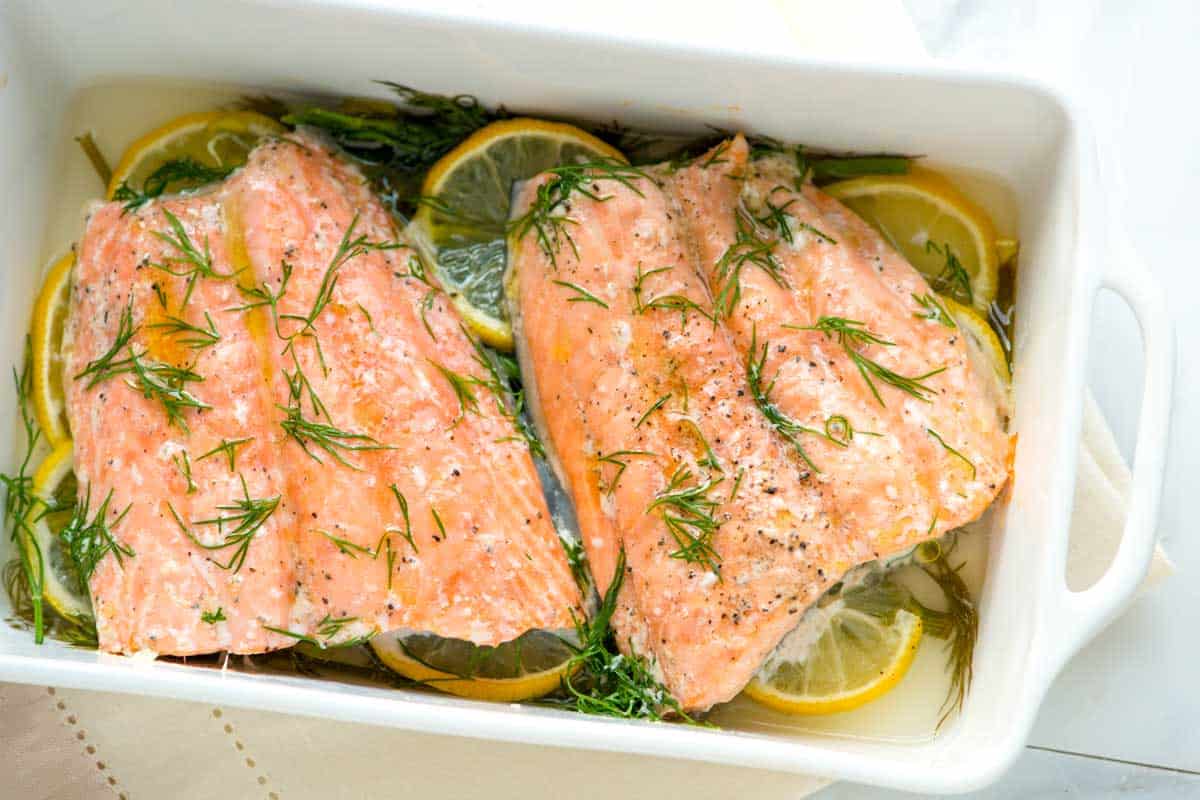Salmon is a beloved seafood choice for many households due to its versatility, health benefits, and quick cooking time. However, one common issue that some encounter when preparing salmon is its strong fishy odor. In an attempt to mitigate this odor and improve the overall taste, a peculiar technique has gained popularity: soaking salmon in milk. But does this method truly work, or is it just another kitchen myth? In this comprehensive blog post, we’ll delve into the science behind soaking salmon in milk, examine its effectiveness, and explore alternative methods for reducing fishy odors.
Understanding the Theory Behind Soaking Salmon in Milk

The Role of Fatty Acids in Fishy Odor
Salmon, like many other types of fish, contains fatty acids that are prone to oxidation when exposed to air. This oxidation process leads to the formation of volatile compounds, such as trimethylamine oxide (TMAO), trimethylamine (TMA), and ammonia, which are responsible for the characteristic fishy odor. These compounds can develop even in fresh salmon and become more pronounced over time, particularly if the fish is not handled or stored properly.
How Milk Could Help
The idea behind soaking salmon in milk is based on the potential interaction between the proteins in milk and the oxidized fatty acids in the fish. Milk contains proteins such as casein and whey, which have a unique ability to bind to and encapsulate fat molecules. By soaking salmon in milk, it is hypothesized that these proteins may bind to the oxidized fatty acids, effectively neutralizing their odor and taste.
Additionally, milk contains lactic acid, a mild acid that can act as a tenderizer and flavor enhancer. Lactic acid is produced by bacteria during the fermentation process and is present in varying amounts in different types of milk. This acid may further contribute to reducing the fishy odor by altering the chemical composition of the fish surface.
The duration of soaking may also play a role in the effectiveness of this method. While shorter soaking times may provide some benefits, longer soaking durations allow for more extensive interaction between the milk proteins and the fish, potentially leading to greater odor reduction.
Examining the Evidence: Does Soaking Salmon in Milk Work?

Personal Experiments and Testimonials
Numerous individuals have conducted personal experiments to test the efficacy of soaking salmon in milk. These experiments often involve soaking salmon fillets or steaks in milk for varying durations before cooking and then evaluating the resulting odor and taste.
Many of these individuals report positive results, noting a significant reduction in the fishy odor and an improvement in the overall flavor of the salmon. Some have even compared side-by-side tastings of salmon soaked in milk versus untreated salmon, consistently preferring the milk-soaked version.
Testimonials from home cooks and culinary enthusiasts attest to the effectiveness of the milk-soaking method, with some incorporating it as a regular step in their salmon preparation routine. While anecdotal evidence is valuable, it’s important to recognize that individual experiences may vary, and factors such as personal preferences and sensitivities to fishy odors can influence perceptions of effectiveness.
Scientific Studies
In addition to personal experiments and testimonials, a limited number of scientific studies have investigated the efficacy of soaking salmon in milk. These studies typically involve chemical analysis of the fish before and after soaking, as well as sensory evaluations conducted by trained panelists.
While scientific research on this topic is relatively scarce, some studies have reported promising findings. For example, a study published in a food science journal found that soaking salmon in milk resulted in a significant reduction in volatile compounds associated with fishy odor, as measured by gas chromatography-mass spectrometry (GC-MS) analysis.
Similarly, sensory evaluations conducted as part of these studies have indicated that milk-soaked salmon is perceived to have a milder odor and a more pleasant taste compared to untreated salmon. However, it’s worth noting that the sample sizes in these studies are often small, and further research is needed to validate these findings and explore potential mechanisms underlying the observed effects.
Considerations and Limitations
While both personal experiments and scientific studies suggest that soaking salmon in milk can be effective in reducing fishy odors, there are several considerations and limitations to keep in mind:
- Variability in Results: The effectiveness of the milk-soaking method may vary depending on factors such as the type of milk used, the duration of soaking, and the freshness of the salmon. It’s important to experiment with different parameters to find what works best for individual preferences.
- Subjectivity of Sensory Evaluation: Sensory evaluations of fishy odor and taste are subjective and can be influenced by individual differences in perception. Trained panelists may provide more reliable assessments, but even they can exhibit variability in their responses.
- Need for Further Research: While existing evidence is promising, more research is needed to better understand the underlying mechanisms of action and to validate the efficacy of the milk-soaking method across different salmon varieties and preparation techniques.
Exploring Alternative Methods for Reducing Fishy Odors

Citrus Marinades
Citrus marinades offer a refreshing and flavorful alternative to soaking salmon in milk. The acidity of citrus fruits such as lemon, lime, and orange can help neutralize fishy odors while imparting a bright and tangy flavor to the fish. Citrus marinades also contain natural enzymes that can break down proteins in the salmon, resulting in a tender and succulent texture. To use this method, simply marinate the salmon fillets or steaks in a mixture of citrus juice, olive oil, garlic, and herbs for at least 30 minutes before cooking.
Herb and Spice Rubs
Herb and spice rubs are another effective way to mask fishy odors and enhance the flavor of salmon. Popular herbs and spices for salmon include dill, parsley, thyme, rosemary, garlic, and black pepper. Simply mix your desired herbs and spices with olive oil or melted butter to create a flavorful paste, then rub it onto the salmon fillets or steaks before cooking. Allow the salmon to marinate in the herb and spice rub for at least 15 minutes to allow the flavors to penetrate the fish.
Cold Water Soak
A simple cold water soak can also help reduce fishy odors in salmon. This method involves submerging the salmon fillets or steaks in a bowl of cold water for 10 to 15 minutes before cooking. The cold water helps rinse away any excess blood and impurities on the surface of the fish, which can contribute to the fishy odor. After soaking, pat the salmon dry with paper towels before seasoning and cooking as desired.
Acidic Ingredients
In addition to citrus marinades, other acidic ingredients such as vinegar, wine, and yogurt can help neutralize fishy odors in salmon. These acidic ingredients work by breaking down proteins and fats in the fish, resulting in a milder flavor and aroma. Experiment with different acidic ingredients and flavor combinations to find the perfect balance for your taste preferences.
Smoking and Grilling
Smoking and grilling are cooking methods that can impart rich, smoky flavors to salmon while reducing fishy odors. Smoking salmon over wood chips such as cedar, hickory, or mesquite adds a delicious smokiness that complements the natural flavor of the fish. Grilling salmon over an open flame caramelizes the sugars in the fish, creating a flavorful crust and reducing the intensity of any fishy odors. Both smoking and grilling are excellent options for enhancing the taste and aroma of salmon while minimizing undesirable odors.
Conclusion
Soaking salmon in milk appears to be a viable method for reducing fishy odors and improving the overall taste of the fish, according to both anecdotal evidence and limited scientific studies. However, individual results may vary depending on factors such as the type of milk used, the duration of soaking, and personal preferences.
While the milk-soaking method shows promise, it’s essential to consider alternative approaches and experiment with different techniques to find what works best for you. Whether you opt for citrus marinades, herb and spice rubs, or a simple cold water soak, the goal remains the same: to enjoy delicious, aromatic salmon dishes without the overpowering fishy odor. So, the next time you’re preparing salmon for dinner, why not give soaking it in milk a try? You might be pleasantly surprised by the results!





